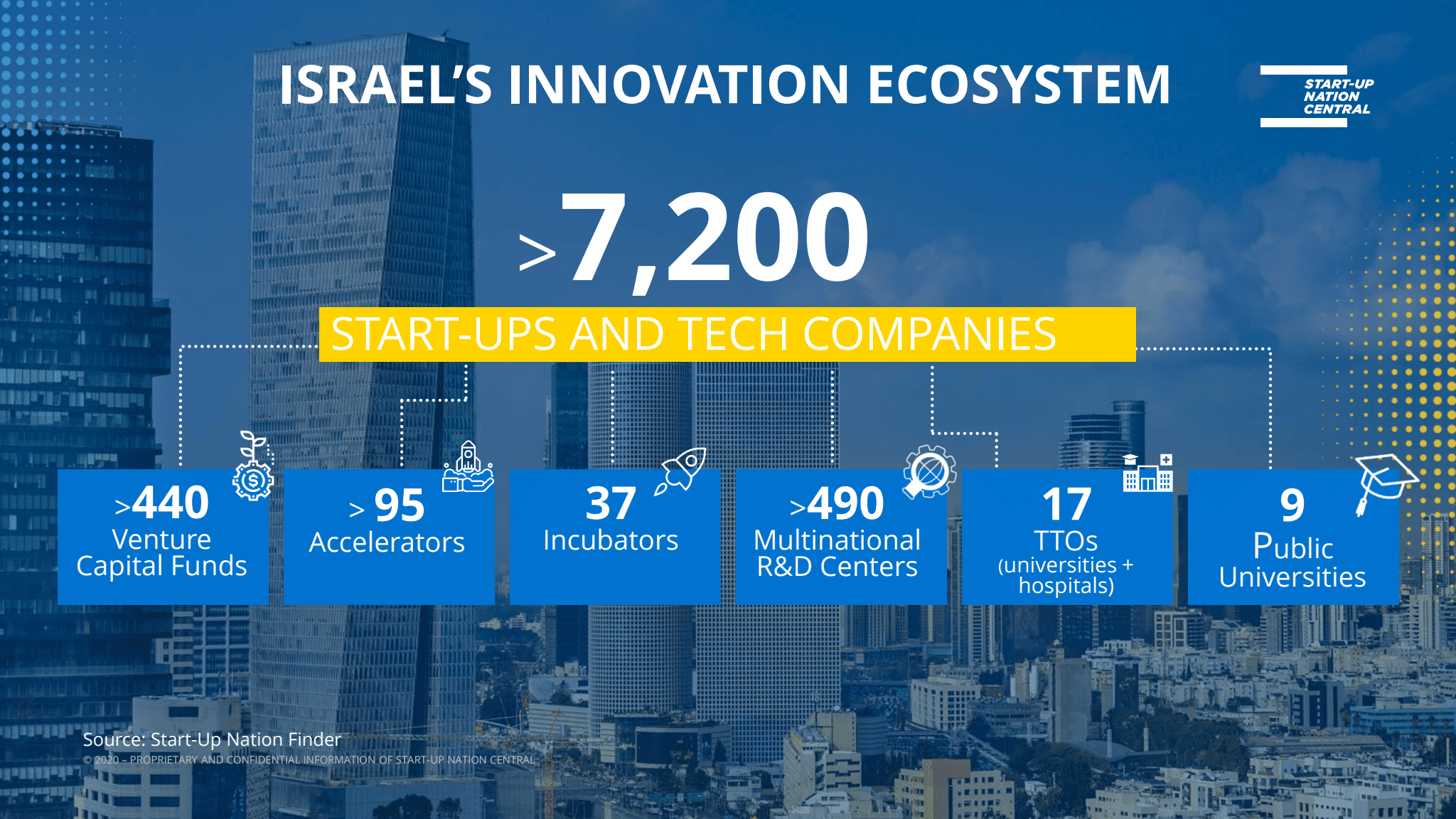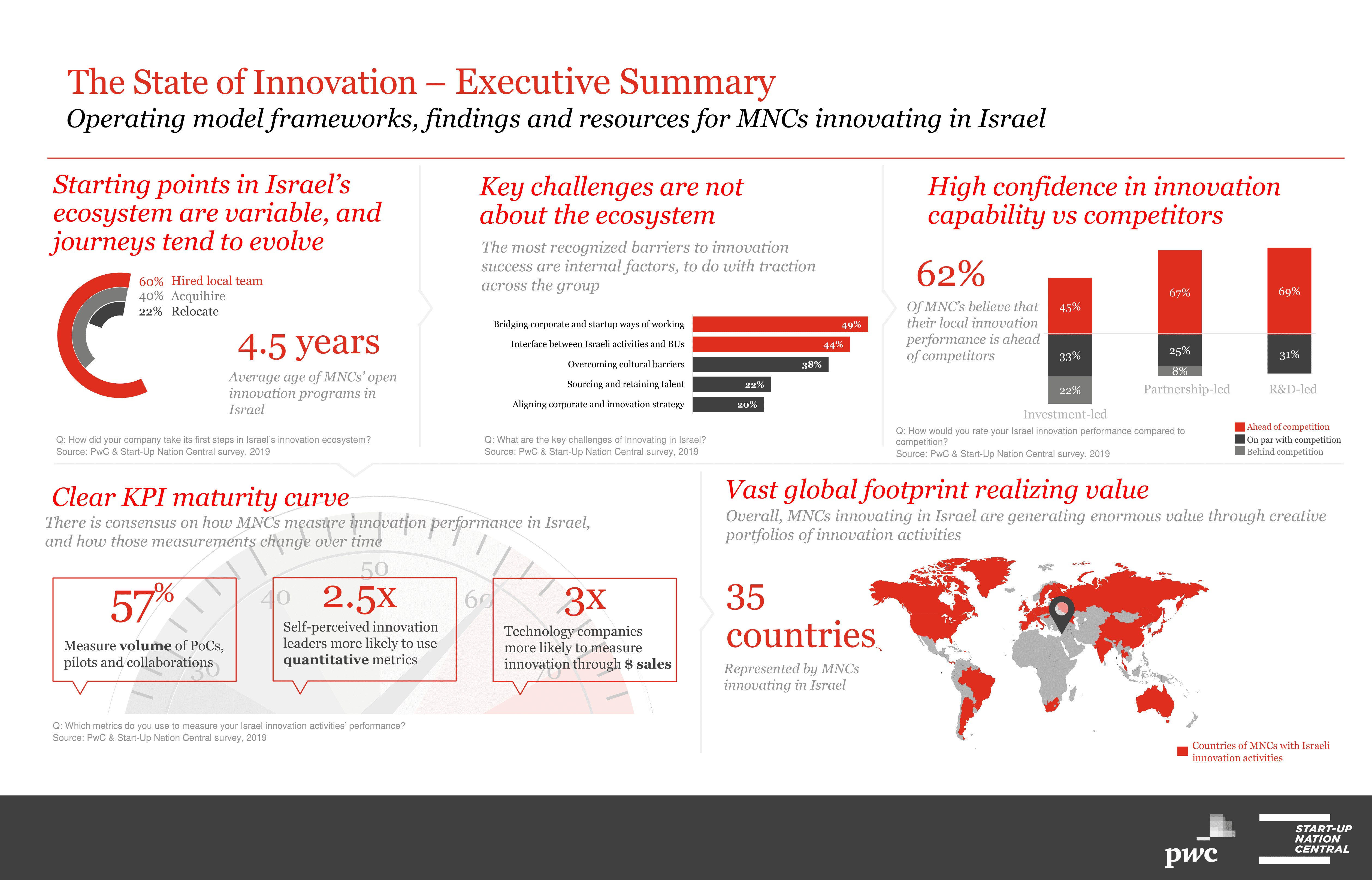Innovating in Israel: Tips for a Successful POC Startup
Tech Innovation
Israel is where multinational corporations (MNCs) come to innovate.
Over the past 20 years, MNCs from all industries have flocked to the “Startup Nation” to enhance their capabilities through partnerships and investments. As of 2022, more than 530 MNCs from 35 countries have a presence in Israel, including tech giants like Intel, Google, and Facebook, and top venture capital firms. Many of these have launched a proof-of-concept (POC) with local entrepreneurs and these POC startups have been crucial to these partnerships.

They’re attracted by Israeli’s history of successful innovation.
Israel has innovated from the very beginning to overcome a lack of natural resources and a challenging geopolitical environment. Overcoming these obstacles has led Israeli innovators to envision and develop world-changing technologies in water, agriculture, and other sectors. This culture of innovation has expanded into a thriving knowledge-based economy – Israel is now home to the largest startup ecosystem outside the US and is the world leader in the number of startups per capita. With over 7200 innovative companies, Israeli innovation is bringing scalable solutions to the world and helping solve pressing shared challenges. These changes almost always start with a POC startup concept.
How MNCs Innovate in Israel: Proof-of-Concept
For MNCs, running a proof-of-concept (POC) is the preferred method of innovating in Israel. A POC startup allows companies to evaluate the feasibility of a startup’s product or service in a limited scope. This process differs from other similar activities such as pilot programs or minimum viable products (MVPs), which may focus on early testing in real-world conditions or in a scaled-down format. In comparison, POCs specifically aim to validate an initial concept. A report by PWC and Start-Up Nation Central found that 71% of MNCs in Israel are conducting POCs with startups.

7 tips for establishing the foundation of a successful POC partnership
Corporations and startups have vastly different foundations, but this means the two complement each other, delivering mutual benefit and value. As this relationship evolves, it’s vital for both startups and corporations to have a clear roadmap that maximizes output and drives collaborative innovation. The secret to a thriving partnership is to approach it as an ongoing, shared journey, rather than a one-off encounter with mutual interests.
Some ways that MNCs can establish a strong foundation for successful partnerships with innovative startups include the following:
1. Know your pain points.
To start a successful innovation journey, begin with an honest evaluation of key competencies and pain points, including both customer experience and internal systems and procedures. Every department should prioritize areas for improvement, which will guide future progress. Before reaching out to startups, clarify needs and focus on crucial issues aligned with corporate strategy. Prioritize the needs and challenges and translate them into practical problem statements.
2. Designate an internal corporate champion.
To ensure successful collaboration, it’s crucial to have a high-level commitment from management and business units. To achieve this, designate an internal corporate champion who will be dedicated to the project and can lead it to a successful conclusion. As a rule of thumb, the champion should be a passionate advocate who is able to exert influence on decision-makers and drive collaboration forward. Some employees are likely to perceive tasks related to a POC as simply another chore and not a labor of love. Therefore, it is critical to find and appoint a champion who has the experience, mandate, resources, and incentive to take the helm of the POC and guide it toward success.
3. Source and evaluate relevant startups.
You can use Start-Up Nation Finder, our free online engagement platform for the Israeli tech ecosystem, to locate innovative tech solutions that match your specific criteria. The platform provides data insights and connections to key industry players, enabling users to create business value through collaboration. You can use Finder’s advanced filters to quickly find exactly the innovative tech solutions you’re looking for.
4. Foster open dialogue.
The first discussions between startups and corporations can be slow to achieve alignment. To prepare, corporations and startups should build a communication plan in advance for meetings with business unit managers and technical experts. Members of open innovation teams who are familiar with the corporate culture, personnel, and needs, should lead this preparation. Timely feedback on POC startup models should be submitted within 2-3 weeks from the initial meetings to prevent unrealistic expectations and allow startups to move forward. Regardless of the outcome of these initial meetings, maintaining contact with the startup and keeping doors open will ensure that you don’t miss out on potential future opportunities.
5. Formulate a collaboration model.
Corporate open innovation platforms and acceleration programs enhance the flexibility and efficiency of collaborations through structured legal frameworks, investment and compensation policies, and direct communication with corporate decision-makers. These programs are beneficial for both corporations and startups, offering improved collaboration and access to high-profile mentors and stakeholders.
6. Apply a relevant use case.
Selecting a good use case is critical to planning and executing a successful POC startup concept; corporations should choose a use case that is valuable for the organization, or at least one that provides meaningful validation of the concept or technology. Many startups have already developed solutions for use cases that are relevant to the goals and KPIs of your project, or that can be adapted to suit them. Relevant use cases are those that don’t require major adjustments, are quantifiable and replicable, and may be applicable for the startup at later stages.
7. Help startups prepare for legal requirements.
Startups can face delays or failure in partnerships or ventures due to a lack of understanding of regulatory, bureaucratic, security, or other corporate requirements. To avoid this, corporations should provide a detailed list of requirements before entering into an agreement, including any regulatory and information security requirements, to ensure the startup has the capacity and resources to meet them. Protecting sensitive data and intellectual property is crucial for companies, especially those in healthcare, finance, insurance, and government, requiring compliance with standards such as GDPR and PCI data regulation.
You’ve launched a POC! Time to track, measure, analyze, and report.
To ensure the success of a Proof of Concept (POC), it is crucial to continually track and monitor its progress. The results of the POC should demonstrate how the startup’s solution will perform in the actual environment, and the more closely the evaluation environment resembles the legacy system, the more accurately its behavior can be predicted.
Over the past decade, our team has worked with some of the most influential global players including leading multinational cooperations and Fortune 500 companies, held thousands of corporate engagements, and generated significant business outcomes. These include investments, joint ventures, technology pilots, POCs, commercial agreements, and the establishment of local R&D and innovation centers.
—
This quick guide to innovating in Israel was created with content extracted from The POC Playbook by Start-Up Nation Central and OurCrowd.
 Tech Ecosystem
Tech Ecosystem Human Capital
Human Capital Focus Sector
Focus Sector Business Opportunities
Business Opportunities Investment in Israel
Investment in Israel Innovation Diplomacy
Innovation Diplomacy Leadership Circle
Leadership Circle Our Story
Our Story Management Team
Management Team Careers
Careers